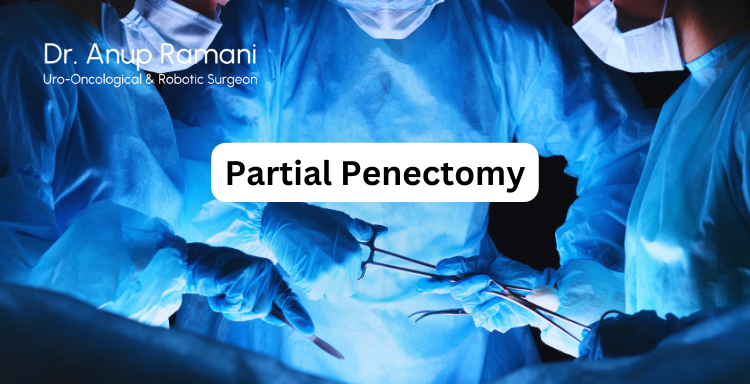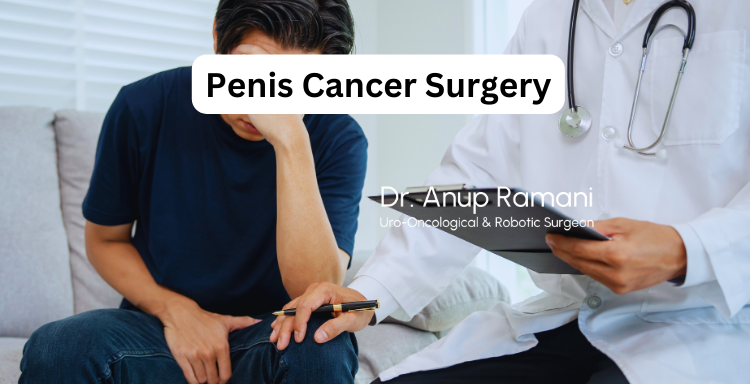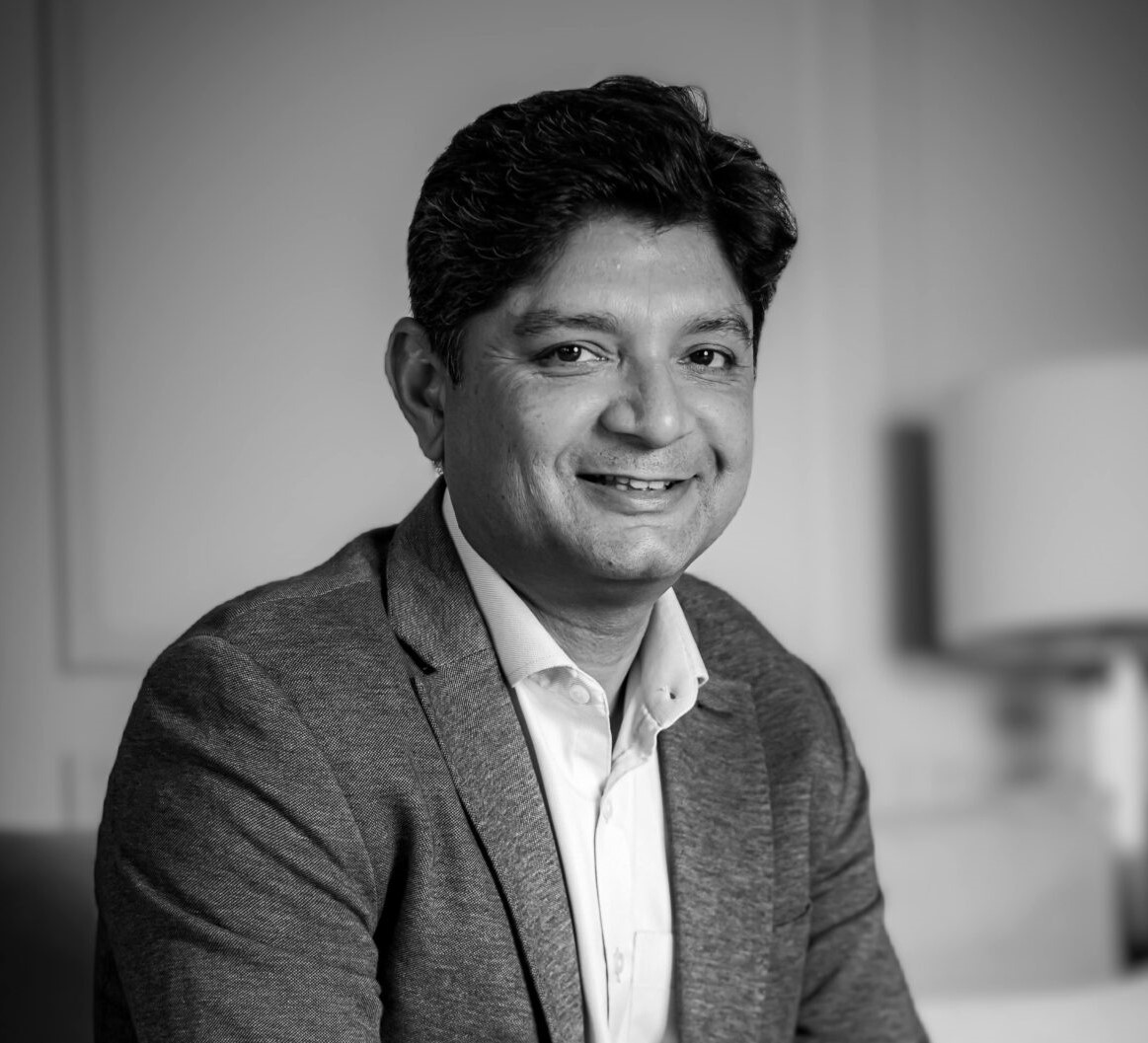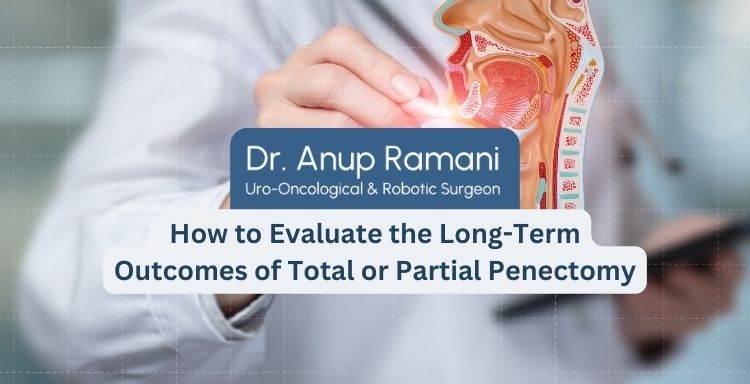Dr Anup Ramani @ Copyright 2024
By Dr. Anup Ramani
Penile cancer is a rare but serious condition that may require surgical interventions like partial penectomy or total penectomy surgery. These procedures aim to remove cancerous tissue while preserving as much function and quality of life as possible. Evaluating the long-term outcomes after such surgeries is essential for understanding the success of the treatment, addressing post-surgical challenges, and planning ongoing care.
In this article, we will explore the key factors for assessing long-term outcomes, highlight the role of specialists in penis cancer surgery, and discuss the implications of undergoing these procedures in leading medical hubs like Mumbai or elsewhere in India.
What is a Penectomy?
A penectomy is a surgical procedure to remove part or all of the penis to treat penile cancer.
- Partial Penectomy:
Removes only the affected portion of the penis, preserving as much length and function as possible. - Total Penectomy:
Involves removing the entire penis and reconstructing the urethra for urinary function.
These surgeries are often performed by highly skilled penis cancer surgeons, particularly for cases where cancer has not spread beyond the penile tissue.
Why Long-Term Evaluation is Important?
Post-surgical evaluation helps in:
- Assessing Cancer Control:
Determining whether the surgery successfully eliminated the cancer and prevented recurrence. - Monitoring Physical Recovery:
Tracking healing progress, urinary function, and any complications related to the surgery. - Evaluating Psychological Well-Being:
Addressing emotional challenges and changes in self-perception or intimacy. - Optimizing Quality of Life:
Ensuring the patient can adapt to lifestyle changes effectively.

Factors to Consider When Evaluating Outcomes
1. Oncological Outcomes
The primary goal of penis cancer surgery is to completely remove cancerous cells. Regular follow-ups are necessary to monitor for recurrence through:
- Imaging tests.
- Physical examinations.
- Tumor marker assessments.
2. Functional Outcomes
Post-surgical recovery should focus on urinary function and sexual health:
- Urinary Function:
- After partial penectomy, most patients retain normal urination abilities.
- For total penectomy, a perineal urethrostomy (an alternative opening for urination) is created, requiring adjustments in daily routines.
- Sexual Function:
- Patients undergoing partial penectomy surgery may retain some sexual function, while total penectomy significantly impacts it.
- Counseling and reconstructive options like prosthetic implants can help improve outcomes.
3. Psychological Well-Being
Surgical removal of part or all of the penis can have profound emotional and psychological effects. Addressing these through:
- Support groups.
- Therapy sessions.
- Open communication with healthcare providers.
Key Indicators of Successful Outcomes
Cancer-Free Survival
Patients who remain cancer-free five years after penis cancer surgery are considered to have a positive long-term outcome.
Improved Quality of Life
Factors like resuming daily activities, adapting to urinary and sexual changes, and maintaining emotional well-being indicate successful recovery.
Minimal Complications
A low incidence of post-surgical complications such as infections, urinary issues, or psychological distress is a critical success measure.

Role of Specialists in Long-Term Recovery
The expertise of penis cancer surgeons significantly influences recovery and outcomes. Specialists in Mumbai and across India provide advanced care, offering:
- Organ-Preserving Surgery Expertise:
Surgeons skilled in partial penectomy surgery aim to balance cancer removal with functional preservation. - Comprehensive Post-Surgical Care:
Top facilities in Mumbai deliver holistic care, including physiotherapy, psychological support, and follow-up evaluations. - Advanced Surgical Techniques:
Facilities offering penis cancer treatment in India use cutting-edge technology to enhance precision and reduce recovery time.
Evaluating Penis Cancer Surgery Options in Mumbai and India
Penis Cancer Surgery in Mumbai
Mumbai is home to some of the best hospitals and penis cancer surgeons, offering:
- Access to partial penectomy surgeons skilled in organ-preserving techniques.
- Comprehensive care packages for international and domestic patients.
- State-of-the-art diagnostic tools and advanced surgical equipment.
Penis Cancer Treatment in India
India offers affordable, high-quality care for penis cancer treatment, including:
- Multidisciplinary teams for comprehensive treatment.
- Personalized care plans tailored to individual needs.
- Experienced surgeons specializing in penis cancer surgery and post-operative care.
Long-Term Complications to Monitor
While most patients recover well after penectomy surgeries, some complications may arise:
- Infection or Wound Healing Issues:
Proper hygiene and timely follow-ups are crucial to avoid these. - Urinary Strictures:
Scar tissue can narrow the urethra, requiring additional interventions. - Emotional Challenges:
Depression or anxiety may occur due to changes in body image and function. - Recurrence of Cancer:
Regular monitoring helps detect any signs of recurrence early.
Improving Long-Term Outcomes
- Follow-Up Care
Scheduled follow-ups with your penis cancer surgeon are essential to monitor for complications and recurrence.
- Lifestyle Adjustments
Adopting healthy habits, such as maintaining hygiene, avoiding smoking, and adhering to a nutritious diet, supports overall recovery.
- Rehabilitation Programs
Programs focusing on physical and psychological rehabilitation can help patients adjust to life post-surgery.
- Patient Education
Educating patients about what to expect during recovery empowers them to manage their health effectively.
Support Systems for Patients
- Medical Teams:
Multidisciplinary teams in leading hospitals provide comprehensive support. - Peer Support Groups:
Connecting with other patients recovering from partial or total penectomy can provide emotional support. - Mental Health Professionals:
Therapists help address emotional challenges and rebuild self-confidence.
Conclusion
Evaluating the long-term outcomes of total or partial penectomy requires a holistic approach, considering oncological success, functional recovery, psychological well-being, and quality of life. With access to experienced penis cancer surgeons in Mumbai and leading healthcare providers across India, patients can achieve positive outcomes and adapt to life after surgery effectively. Regular follow-ups, lifestyle adjustments, and robust support systems ensure a smoother recovery journey and improved long-term health.
FAQs About Partial Penectomy
1. What is the recovery time after partial or total penectomy?
Recovery time varies, but most patients resume daily activities within 4–6 weeks, depending on the procedure and overall health.
2. Can sexual function be preserved after partial penectomy?
Yes, many patients retain some degree of sexual function after partial penectomy, though total penectomy significantly impacts this aspect.
3. Why is Mumbai a preferred destination for penis cancer surgery?
Mumbai offers access to skilled surgeons, state-of-the-art facilities, and comprehensive care, making it a top choice for penis cancer surgery in India.
4. How often should follow-ups be scheduled after surgery?
Follow-ups are typically recommended every 3–6 months during the first year and annually thereafter to monitor recovery and detect any recurrence.
5. What support systems are available for patients post-surgery?
Support includes medical teams, peer groups, mental health professionals, and rehabilitation programs to aid recovery and emotional well-being.
Read More Articles on Partial Penectomy
- Partial Penectomy: A Closer Look at Organ-Preserving Surgery
- Robotic Urological Surgery in Worli: A New Era of Precision Care with Dr. Anup Ramani
- Dr. Anup Ramani: Leading Uro-Oncologist and Pioneer in Robotic Surgery in India
- The Psychological Impact of Penis Cancer Surgery: Exploring the Emotional and Psychological Effects
About Author

Uro-Oncological & Robotic Surgeon
Dr. Anup Ramani is a robotic uro-oncological surgeon and an internationally recognized expert in robotic surgery for prostate, kidney and urinary bladder cancers. With more than two decades of robotic experience and 2,000+ robotic procedures, he brings unmatched precision and outcomes to complex uro-oncology cases. He is widely published in his field and is known for a personal, transparent approach-often spending over an hour in initial consultations to educate patients on its disease, surgery and recovery. His expertise spans prostate cancer treatment, kidney and bladder cancer surgery, adrenal gland surgery, kidney stone treatment, penile cancer surgery and enlarged prostate management. Dr. Ramani advocates the advantages of robotic surgery-magnified 3D vision, tremor-filtered precision, minimal scarring, lower blood loss and faster recovery-helping patients return to life sooner.
Table of Contents
Recent Blogs
Best Uro-Oncological surgeon
Specialist in India for Robotic Surgery
MCh, DNB, MS, DNB
Dr. Anup Ramani
CONTACT
Uro-Oncologist in India,
Best Robotic Surgeon for Uro Oncology Surgery
1407, One Lodha Place Next to World Towers Senapati Bapat Marg, Worli, Mumbai. 400013.
Dr Anup Ramani @ Copyright 2024 – Website Maintenance, SEO & GEO by Opal Infotech
- Partial penectomy is done in cases where glans and distal penis is involved with carcinoma.
- Partial penectomy is a type of organ-preserving surgery. Preservation of sexual and micturational function depends on the surgical dissection and reconstruction of residual urethra.
- Patients who develop stones in the kidney or ureter, often experience severe pain.
- This condition usually needs a procedure to remove the kidney stones.
- This procedure is called ureteroscopy and is performed very commonly.
- It does not require any cuts and hence it is painless.
- The procedure is performed with an endoscope inserted through the penis under spinal anesthesia.
- The scope is inserted through the penis into the kidney and stones are dissolved with a laser.
- The procedure takes about 40-50 minutes.
- A catheter (urine pipe) is kept after the procedure to drain the bladder. A stent is kept in the kidney at the same time.
- Patient is mobile and walking in the room the same evening.
- Hospital stay is one night and patient is discharged the next day after removal of the catheter.
- Patient has to come back after six weeks to remove the stent in the kidney.
- Patients can resume office a week after surgery and heavy activities like running, weight lifting, a month after the procedure.
- We offer fixed packages for this procedure which can be obtained by calling our helpline +91 9967666060.
- Men with an enlarged prostate, which is a normal ageing changes, often experiencing difficulty passing urine. This condition usually needs a procedure to trim the prostate and relieve the blockage.
- This procedure is called TURP and is performed very commonly.
- It does not require any cuts and hence it is painless.
- The procedure is performed with an endoscope inserted through the penis under spinal anaesthesia.
- The overgrown prostate is dissolved with a laser bloodlessly.
- The procedure takes about 40 minutes.
- A catheter (urine pipe) is kept after the procedure to drain the bladder.
- Patient is mobile and walking in the room the same evening.
- Hospital stay is two nights and patient is discharged with the catheter, which is removed after 4 days.
- Patients can resume office a week after surgery and heavy activities like running, weight lifting, a month after the procedure.
- We offer fixed packages for this procedure which can be obtained by calling our helpline +91 9967666060.
-
Robotic adrenalectomy is a sophisticated, complex surgery and it is very important that an experienced surgeon performs this surgery to avoid major complications.
-
Once the anesthesia is done, and patient positioned, three micro cuts (3mm each) are made in the patient’s abdomen.
-
The arms of the Da Vinci robot are connected to the cuts via ports (tubes).
-
Dr. Ramani then sits in the controlling console to perform the surgery.
-
On an average, a robotic adrenalectomy takes one hour.
-
The surgery is almost completely bloodless and there has never been any need to transfuse blood after surgery.
-
A urine catheter and bag to drain the bladder is inserted during surgery.
-
A tiny drain pipe may be inserted in the surgical side of the abdomen, connected to a bag.
-
Patient is kept nil-by-mouth the day of the surgery, with IV fluids. Sips of water are started the next day and solid food by day three.
-
The drain pipe, if kept, is removed in the room on day 2 after surgery.
-
The catheter is removed on day two after surgery.
-
Total hospital stay for robotic adrenalectomy is 4 nights (including night before surgery).
-
Post discharge, a doctor from the surgical team visits the patient at home/ hotel room once every day.
On the day of discharge, patient is totally self-sufficient. They are able to walk freely without any pain, dress themselves, shower, toilet and they do not need to hire any nurse or help at home. Almost all patients are back to work within 2 weeks of surgery.
Heavy activities like running, weight lifting can be resumed after a month
Follow up after an adrenalectomy is in the form of CT scans, once a year for 5 years.
Local patients usually meet Dr. Ramani after two weeks to discuss report.Outstation patients are counselled on a phone consultation.
- Dr. Ramani is one of the very few surgeons in India who has the expertise to perform a robotic surgery for bladder cancer, which includes removing the urinary bladder and reconstructing a new bladder robotically.
- Robotic radical cystectomy is an extremely sophisticated, complex surgery and it is very important that an experienced surgeon performs this surgery to avoid major complications.
- Once the anaesthesia is done, and patient positioned, six micro cuts (3mm each) are made in the patient’s abdomen.
- The arms of the Da Vinci robot are connected to the cuts via ports (tubes).
- Dr. Ramani then sits in the controlling console to perform the surgery.
- On an average, a robotic radical cystectomy with an ileal conduit takes 3-4 hours.
- The surgery is almost completely bloodless and there has never been any need to transfuse blood after surgery.
- A urine catheter and bag to drain the new bladder is inserted during surgery.
- Two tiny drain pipe in inserted in the surgical side of the abdomen, connected to a bag.
- Patient is kept nil-by-mouth for 4 days after surgery with IV supplementation of patient’s daily requirements of calories, fats, carbohydrates, proteins and electrolytes.
- The drain pipes are removed in the room on day 3-5 after surgery.
- Total hospital stay for radical cystectomy is 8 nights (including night before surgery).
- Post discharge, a doctor from the surgical team visits the patient at home/ hotel room once every day.
- On the day of discharge, patient is totally self-sufficient. They are able to walk freely without any pain, dress themselves, shower, toilet and they do not need to hire any nurse or help at home.
- Almost all patients are back to work within 6 weeks of surgery. Heavy activities like running, weight lifting can be resumed after two months.
Follow up after a radical a cystectomy is in the form of CT scans, once a year for 5 years.
Histopathology report: Local patients usually meet Dr. Ramani after two weeks to discuss report.
Outstation patients are counselled on a phone consult. Depending on the report, patient may or may not need chemotherapy after surgery.
If chemo is needed, patients may choose to get it done with a medical oncologist of their choice or avail the services of one of the four medical oncologists on our team.
- Robotic partial nephrectomy is a sophisticated, complex surgery and it is very important that an experienced surgeon performs this surgery to avoid major complications. Robotic radical (total) nephrectomy is
- relatively easier but still requires significant experience to consistently deliver results.
- Once the anaesthesia is done, and patient positioned, five micro cuts (3mm each) are made in the patient’s abdomen.
- The arms of the Da Vinci robot are connected to the cuts via ports (tubes).
- Dr. Ramani then sits in the controlling console to perform the surgery.
- On an average, a robotic radical nephrectomy takes one hour and a robotic partial nephrectomy takes about an hour and half.
- The surgery is almost completely bloodless and there has never been any need to transfuse blood after surgery.
- A urine catheter and bag to drain the bladder is inserted during surgery.
- A tiny drain pipe in inserted in the surgical side of the abdomen, connected to a bag.
- Patient is kept nil-by-mouth the day of the surgery, with IV fluids. Sips of water are started the next day and solid food by day three.
- The drain pipe is removed in the room on day 3 after surgery. The catheter is removed on day two after surgery.
- Total hospital stay for radical/partial nephrectomy is 4 nights (including night before surgery).
- Post discharge, a doctor from the surgical team visits the patient at home/ hotel room once every day.
- On the day of discharge, patient is totally self- sufficient.
- They are able to walk freely without any pain, dress themselves, shower, toilet and they do not need to hire any nurse or help at home.
- Almost all patients are back to work within 2-3 weeks of surgery.
- Heavy activities like running, weight lifting can be resumed after a month.
- Follow up after a radical/partial Nephrectomy is in the form of CT scans, once a year for 5 years.
- Local patients usually meet Dr. Ramani after two weeks to discuss report.
- Outstation patients are counselled on a phone consultation.







